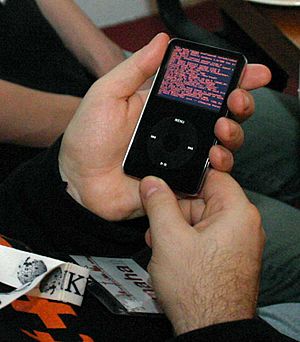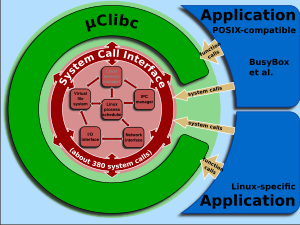- This page was last modified on 26 February 2026, at 13:30. Suggest an edit.
μClinux facts for kids
| μClinux | |
|---|---|

An iPod booting iPodLinux, based on μClinux
|
|
| OS family | Embedded Linux |
| Working state | Current |
| Source model | Open source |
| Repository |
|
| Supported platforms | See below |
| Kernel type | Linux kernel-fork |
| Userland | uClinux-dist, uClibc, BusyBox |

uClibc helps programs talk to the Linux kernel or μClinux.
μClinux is a special version of the Linux kernel. Think of the Linux kernel as the main brain of an operating system. This special version was made for very small computers called microcontrollers. These microcontrollers don't have a special part called a memory management unit (MMU), which helps manage computer memory.
The letters "μC" stand for "microcontroller." So, you say the name "you-see-Linux," not like the Greek letter "mu."
μClinux was first a separate project, but most of its important parts were later added into the main Linux kernel. Even so, the project still creates updates and tools for microcontrollers. It has been used in many everyday devices.
Contents
How μClinux Started
μClinux was first created in 1998 by D. Jeff Dionne and Kenneth Albanowski. They wanted to make Linux work on small, built-in computer chips.
Early Devices and Growth
At first, μClinux was made for Motorola DragonBall processors. These were chips used in devices like the Motorola PalmPilot. Soon, many other developers joined in. They helped make μClinux work on newer Linux versions and different types of processors.
In early 1999, it started supporting Motorola ColdFire processors. Later, it also gained support for ARM processors, which are very common in mobile phones and other devices today.
Joining the Main Linux Kernel
Over time, μClinux became so important that its main parts were added directly into the main Linux kernel. This happened around version 2.5.46 of the Linux kernel. This means μClinux is no longer a completely separate version of Linux. Instead, its features are built right into the main Linux system for many types of processors.
Greg Ungerer, who helped bring μClinux to ColdFire processors, continued to work on adding μClinux features to newer Linux kernels.
What Devices Use μClinux?
μClinux has been used in many different products. Because it's small and efficient, it's perfect for devices that don't have a lot of memory or processing power.
Some examples of devices that have used μClinux include:
- Network routers (devices that help connect your home to the internet)
- Security cameras
- DVD and MP3 players
- VoIP phones (phones that use the internet for calls)
- Scanners
- Card readers
Processors μClinux Supports
μClinux works with many different kinds of computer processors. These are like the "brains" of the devices.
Currently Supported Processors
Here are some of the processors that μClinux still supports:
- Altera Nios and Nios II
- Amber (an open-source processor design)
- ARM processors like ARM7TDMI, ARM Cortex-M3/M4/M7, and ARM Cortex-R
- Lattice Mico32
- NXP 680x0 (older Motorola/Freescale processors)
- Hyperstone E1/E2 (also known as hyLinux)
- Intel i960
- MIPS processors
- NXP ColdFire (Motorola/Freescale ColdFire)
- NEC V850E
- Xilinx MicroBlaze
Processors No Longer Supported
Over time, support for some older or less common processors has been removed from μClinux. This helps keep the system updated and efficient.
For example, the Hitachi/Renesas H8 processor was removed in Linux 5.19. Before Linux 4.17, other processors like ADI Blackfin and Fujitsu FR-V were also supported but have since been removed.
See also
 In Spanish: ΜClinux para niños
In Spanish: ΜClinux para niños
